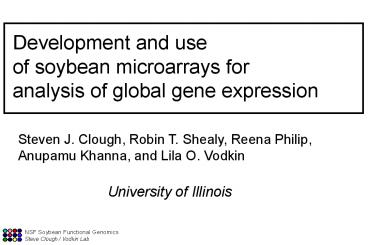Development and use PowerPoint PPT Presentation
1 / 45
Title: Development and use
1
Development and use of soybean microarrays for
analysis of global gene expression
Steven J. Clough, Robin T. Shealy, Reena
Philip, Anupamu Khanna, and Lila O. Vodkin
University of Illinois
2
(No Transcript)
3
(No Transcript)
4
(No Transcript)
5
(No Transcript)
6
(No Transcript)
7
(No Transcript)
8
(No Transcript)
9
(No Transcript)
10
(No Transcript)
11
(No Transcript)
12
(No Transcript)
13
70c
Hot
Printed slide
Snap dry
W
ater
Rehydrate spots
UV light
Block background. Denature to single strands.
Hybridize Scan
Fix DNA to coating
14
Glass
Coatings
Amine
Poly-L-lysine
Silanated
We use SuperAmine and SuperAldehyde from
TeleChem (arrayit.com)
15
(No Transcript)
16
UV-light induced -- random production of free
radicals leading to various C-C, C-O C-N
bonds between DNA and coating
Schiff base reaction -- primary amine of amino
linker of oligo to aldehyde of silylated
coating
S
i
S
i
N
C
C
17
DNA
DNA
DNA
DNA
1. Wash with SDS to remove excess DNA 2. Treat
in solution of sodium borate / succinic anhydride
Result positively charged amine converted to
negatively charge carboxyl group and/or blocked
w/ SDS
18
o
o
N
N
H
NaBH
4
Si
OH
Si
OH
Si
OH
Si
OH
Si
OH
Si
OH
O
O
O
O
O
O
O
O
O
O
O
O
O
O
O
O
Si
O
O
Si
O
O
O
O
O
O
Si
O
O
Si
O
O
O
O
Si
Si
Si
Si
Si
Si
Si
Si
Si
Si
19
70c
Hot
Printed slide
Snap dry
W
ater
Rehydrate spots
UV light
Block background. Denature to single strands.
Hybridize Scan
Fix DNA to coating
20
(No Transcript)
21
(No Transcript)
22
Hybridization in Water Bath
23
Washing After Hybridization
15 minutes with shaking for each
1
2
3
Spin dry
1X SSC
0.2X SSC
0.1X SSC
2 minute
0.
2
SDS
0.2 SDS
500 rpm
24
ScanArray 3000 Fluorescent Scanner
25
Hybridized to array of individual spots of
different genes
Fluorescent intensity of spot is proportional to
expression level
Labelled representation of all recently expressed
genes
26
Scale of increasing fluorescent intensities
1
65,536
Stronger signal
27
Fluorescent intensities from quality data
(Background 80)
28
Cells from condition A
Cells from condition B
mRNA
Label Dye 1
Label Dye 2
cDNA
29
GSI Lumonics
30
(No Transcript)
31
Cy3 Scan
Cy5 Scan
Overlay
32
1. Locates spots, defines spot area 2. Flags bad
spots (ex dust in spot) 3.Calculates ratio Cy5
fluorescent intensity over Cy3 intensity for
each spot 4. Produces tables in
tab-delineated format and scatter plots 5.
Normalizes ratios assuming most genes are
equally expressed
33
D2
34
C10
2 x
1/2 x
35
PO4 /-
2 x
1/2 x
36
(No Transcript)
37
Spotting solution
Genes not present in plant Mammal-specific ant
ibody / immunoglobulin neuro-related myosin
etc.
Verify plant negative by BLAST against plant
databases
38
Tissue specific, high expressers
ex cotyledon conglycinin roots auxin down
regulated gene 12 leaves RUBISCO (small chain)
39
Spiked mRNAs Mammalian genes,
non-homologous to plant genome. Select several
spiking controls (ex 4). To use Include
them on the array. Clone (with polyT tail) into
a T7 or T3 expression vector Or PCR with T7 or
T3 promoter attached to 5 primer and a poly
(dT) to the 3 primer. Invitro transcribe with
T7 or T3 RNA polymerase. Add this mRNA to your
labelling reactions-- each one at a different
concentration level to span the dynamic range
of fluorescent intensities
40
Control Spot Locations
41
(partial list)
Spotting solution Bovine Androgen Receptor
Assoc. Elongation Factor 1 Histone H3.2 and
H4 Tubulin alpha beta Ubiquitin RUBISCO Plasto
cyanin precursor Extensin Phenylalanine Ammonia
Lyase Plastocyanin Calcium ATPase Beta-Conglycin
in Chalcone Synthase Lectin precursor BB-type
Proteinase Inhibitor bar, gusA, gfp5 nptII, hptII
42
(No Transcript)
43
cDNA spot a collection of ESTs
Oligo spot collections of oligos
that span known/predicted ORFs
- need sequence info
- best (only?) option for prokaryotes
- shagged rug spots
44
Spotted Microarray
Affymetrix Gene Chips
Synthesize with 5-amino linker
Synthesize oligo directly on chip
Proprietary photolithography synthesis
Design one to multiple oligos/ORF
16-20 oligo/ORF plus mismatches
Collect in 384-well plates
Spot on aldehyde coated slides
Spotted oligo termed the probe
Perfect match oligos
1-base mismatch oligos
45
Shauna Sommervilles Lab Iian Wilson Erico
Miura Shu-hsing Wu
Pam Greens Lab Jeff Landgraf Matt Larson
Funding sources NSF Soybean Functional
Genomics United Soybean Board North
Central Soybean Research Council

